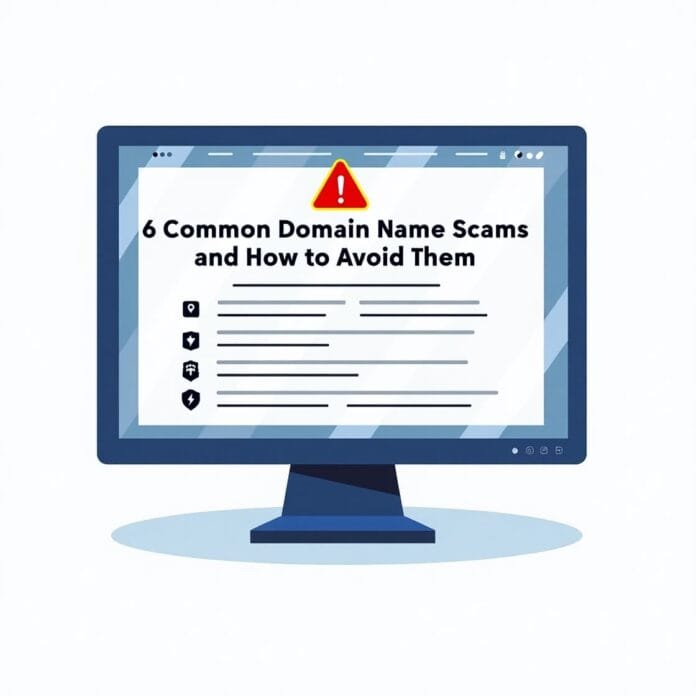Domain name scams is not just the name of your website, it is your online identity. This is why bad people like cyber criminals and scammers try to cheat people with domain name. They use it in such a way that they can steal your important information, money or your domain.
If you have a domain or want to buy one, it is very important to know about these scams so that you can keep yourself safe online.
In this guide we’ll cover 6 popular domain scams, how they work, and how you can avoid them. Once you’ve learned all of this, you’ll be able to protect your domain better.
Want to stay ahead with AI-driven in WordPress insights and stay updated with the latest trends? Subscribe for daily search insights at wpguidepro.com to improve your WordPress strategy.
Table of Contents
What Are Domain Name Scams?
Domain name scams mean such frauds in which bad people try to take advantage of you. They steal your money, try to take over your domain, or take wrong advantage of it.
These people use many tricks – like sending fake emails or creating fake websites from where they steal your important information.
If you know how these scams look, then you can easily save yourself, your work, and your website from them.
Misleading Renewal Notices and Invoices
The most common scam is that you are sent a fake renewal notice or bill. These messages look like a real company – they have their own logo and the writing style is professional.

How does this scam work
You get an email or letter that says renew your domain immediately or else your website will be shut down. There is also a link in the email that asks you to pay money. But if you pay the money, neither the domain is renewed nor do you get your money back. Sometimes your domain even gets transferred to another company.
Things to keep in mind (Red Flags):
• The email address does not match the real company
• You have never worked with the company whose name is mentioned
• The message contains threatening words like “do the work now or else the website will go down”
Pro Tip:
Never click on the link in the email. Always go to the website of your domain company (registrar) and login and check from there whether the domain needs to be renewed or not.
Phishing Scams Leading to Domain Hijacking
Phishing scams are such that the scammers get your necessary login information from you, which can be used to steal your domain.

How this scam works
You get an email that looks like it came from your domain company (registrar). It says confirm your account details or renew your domain. When you click on the link in that email, it takes you to a fake website that looks like the real website. If you enter your username and password there, the scammers steal your domain.
What to look for (Red Flags):
• The email has grammatical mistakes or a weird way of writing
• The link has wrong spellings or it is a weird domain
• Important information is asked from you, like username and password
Pro Tip:
Set up 2FA (two-factor authentication) on your domain account. This means that just the password will not work, an extra code will also be needed. Even if someone steals the password, he will still not be able to login.
Fake Domain Purchase and Appraisal Scams
If you have an expensive or popular domain name, you may get fake offers or appraisal requests.

How this scam works
A scammer sends you an email saying he wants to buy your domain at a very good price. Then he says get your domain’s value checked first and gives a link to a website (often owned by him) for appraisal. When you pay the service, the guy never replies again.
What to keep in mind (Red Flags):
• Suddenly you get an offer which is asking for too much money
• Asking an unknown website for appraisal
• When you give money, the person disappears
Pro Tip:
If someone offers you to buy a domain, always use trusted websites like Sedo or Escrow.com so that the deal is safe.
Trademark Infringement and Related Domain Scams
Some scammers try to scare you and send false legal complaints, in which they say that your domain is a copy of someone else’s trademark. They ask for money or give away the domain.

How this scam works: You get an email that looks exactly like a legal notice. It says your domain is a copy of some company’s name. Then the guy asks you to either give him money or give him your domain, otherwise they will take you to court.
What to look for (Red Flags):
• There is no proof of the original trademark in the email
• The threats are very aggressive or confusing
• They say if you give money, the matter will be solved
Pro Tip:
If you are not sure whether the email is original or not, consult a lawyer or expert without giving an answer
Homograph Attacks (Typosquatting)
Homograph attacks or typosquatting is a scam in which people register a fake or similar version of your website’s name to trick users.

How this scam works: Scammers create domain names that look exactly like real websites like writing rn in place of m or g00gle.com in place of google.com. When people accidentally visit these websites, they give away their important information without thinking.
What to look for (Red Flags):
• Websites that look like real websites but are slightly different
• Pop-up ads or strange things are seen on the site
• The website design is poor or its content is completely irrelevant
Pro Tip:
Register similar names to your domain name yourself so that scammers cannot use them.
Related SEO and Search Engine Submission Scams
These scams target website owners who don’t know much about SEO or search engines.
How this scam works: You get an email saying your domain is not listed properly on search engines (like Google). Then they say they will submit your domain but charge money. In reality, this service is not necessary and is often fake.
What to keep in mind (Red Flags):
• Saying you have to pay to get your website included in search engines (Google shows websites of its own free will)
• Promising that your website will come on top
• Asking for money upfront without giving any clear reason
Pro Tip:
Invest in good and genuine SEO services or tools. Remember, Google searches websites of its own free will, you do not need to submit separately for it.
Tips to Protect Yourself From Domain Name Scams
It is easy to avoid scams if you pay attention to your security beforehand. Here are some important ways to keep your domain safe:
• Register your domain only with a good and well-known company. Trust such companies which have a good track record.
• Install Two-Factor Authentication (2FA), so that the security of your account becomes stronger.
• Always remember the renewal dates of your domain, so that you can make the payment on time and scammers do not take advantage of it.
• If you get any strange or suspicious message, contact your registrar directly, not anyone else.
• If your domain has any wrong spelling or small change which can confuse people, then register those domains too.
• Tell your team about the scams too, so that everyone knows and everyone can take care of themselves.
Frequently Asked Questions About Domain Name Scams
How to identify a fake renewal notice?
Fake notices often come from a registrar you do not know. They talk too quickly or are threatening, and often have incorrect spelling or grammar. Always check the renewal in your original registrar’s account.
Is it necessary to pay money to put your website on a search engine?
No, absolutely not. Google and other search engines find your website for free. If an email asks for money, it could be a scam.
What should I do if I feel I have fallen victim to a scam?
If you suspect you have been scammed, inform your registrar immediately. If necessary, inform your local police. Change your passwords and watch your website carefully.
How can typosquatting scams harm your business?
In typosquatting, people make a small mistake in your website’s name and go to another wrong website. This spoils your name and people go to fraudulent websites.


